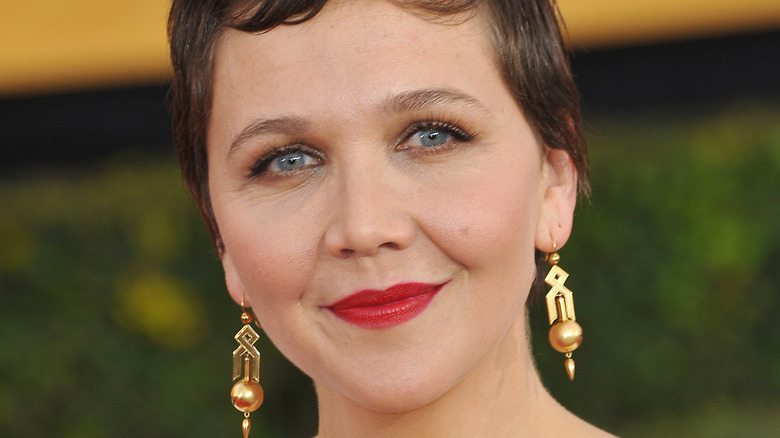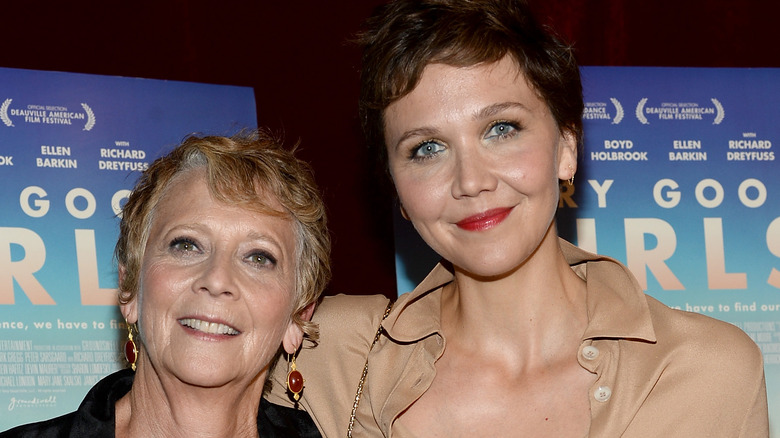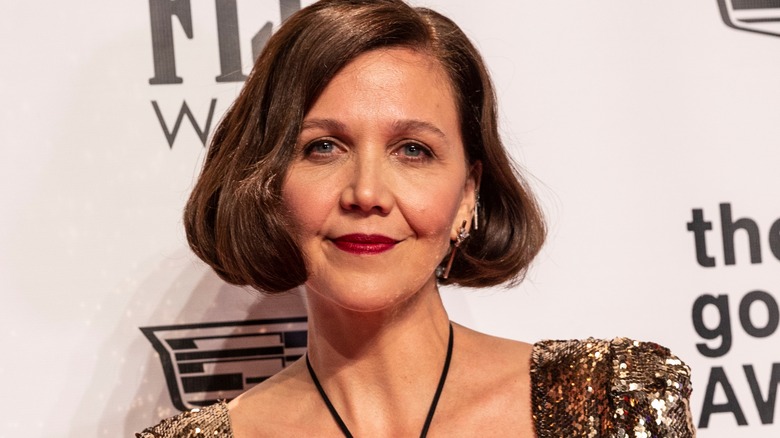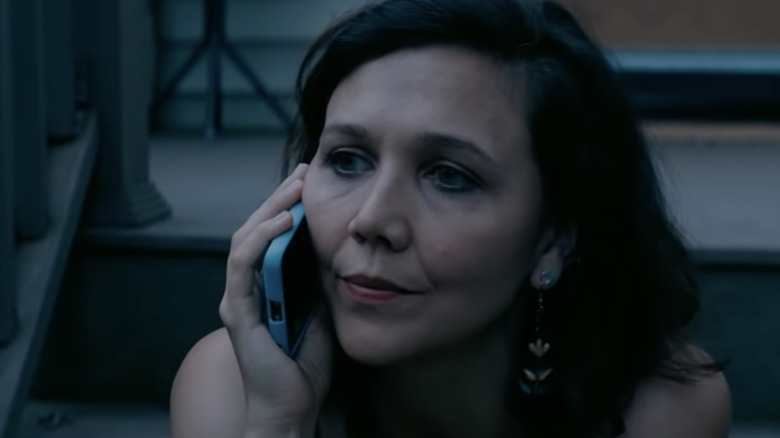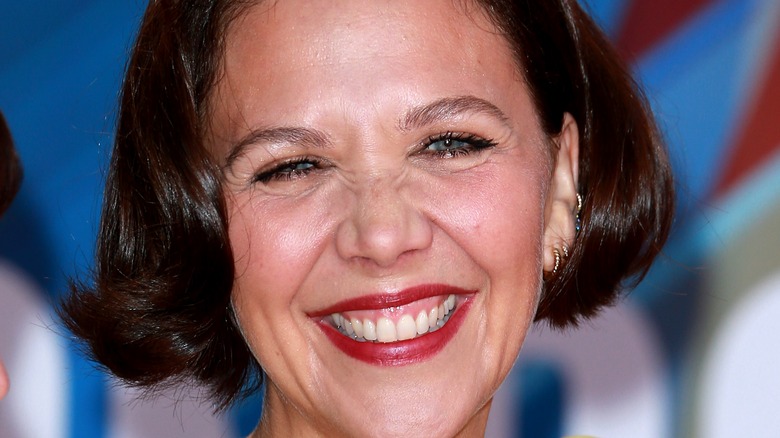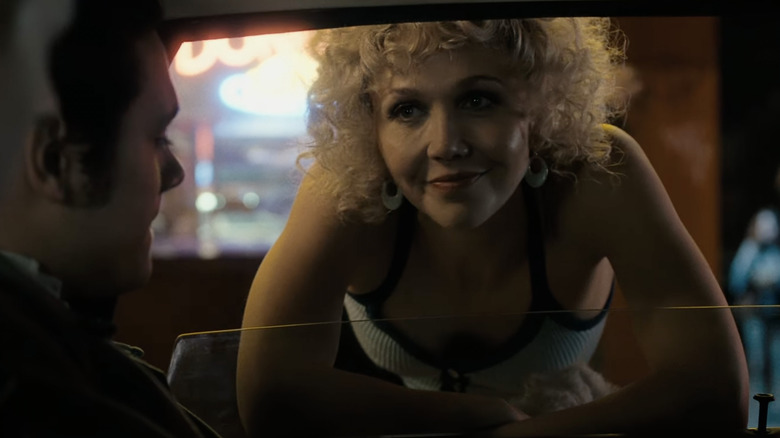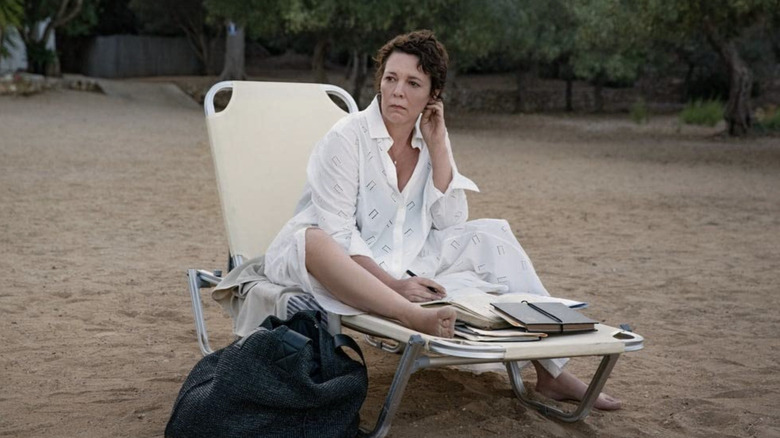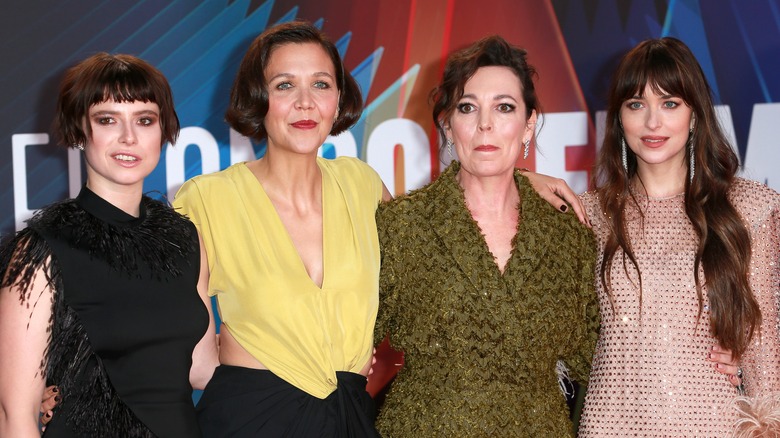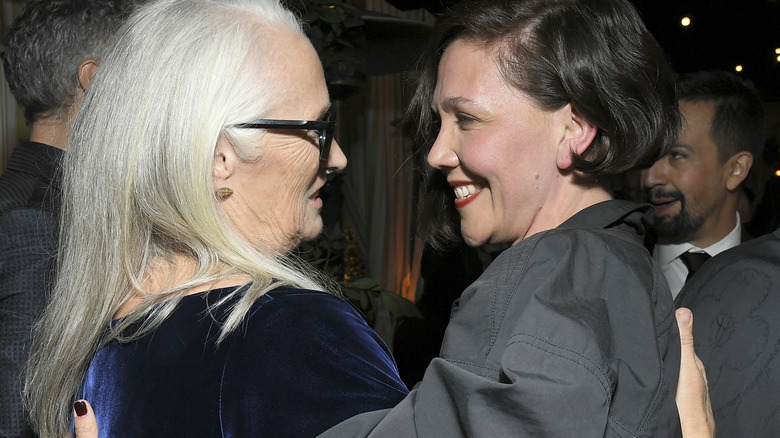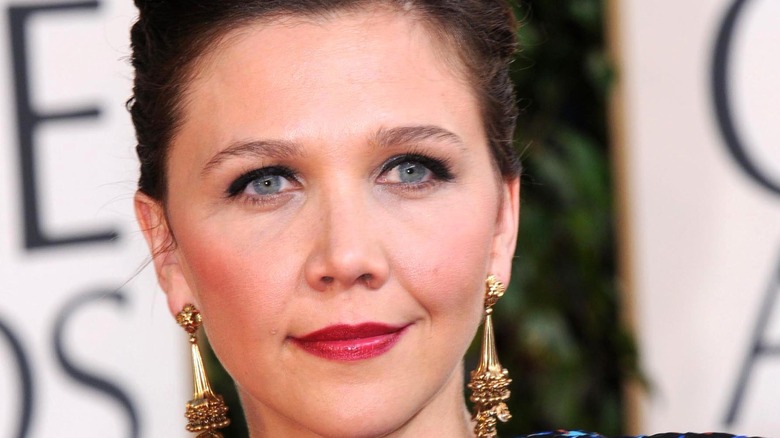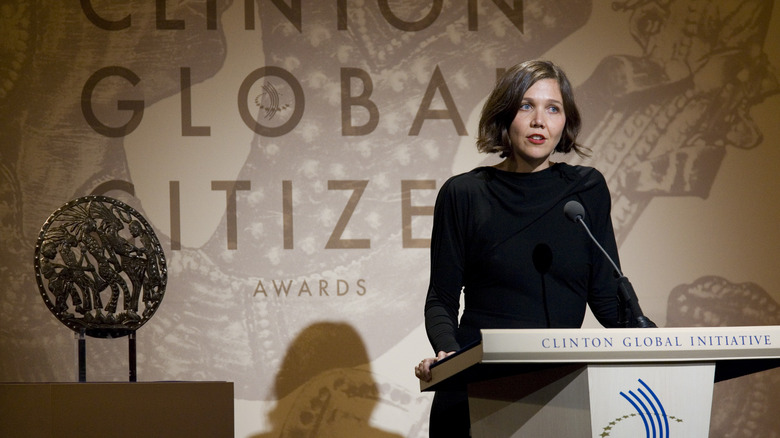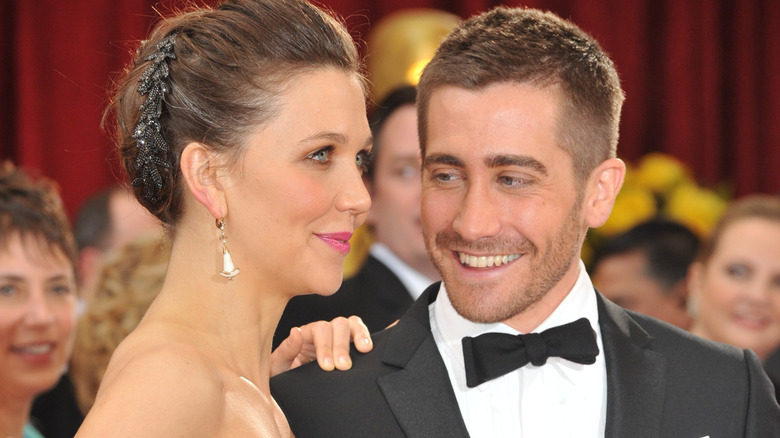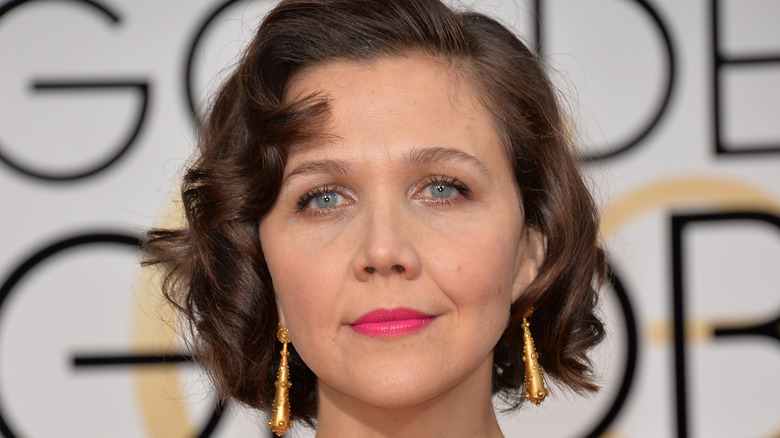The Untold Truth Of Maggie Gyllenhaal
Maggie Gyllenhaal is a unique presence in Hollywood. Her films have ranged from indie darlings such as "Secretary" and "The Kindergarten Teacher" to mainstream marvels such as "The Dark Knight" and "Stranger than Fiction." She comes from a filmmaking dynasty, and not only found success at a very young age but has gone on to become nominated for two Oscars and win a Golden Globe (so far). She is often pulled into the spotlight by her brother, Jake Gyllenhaal, and her husband, Peter Sarsgaard.
However, Maggie Gyllenhaal is a force all her own. Known throughout her career for playing complicated, challenging women, Gyllenhaal made the transition to writer-director with her film "The Lost Daughter" in 2021. Here are some of the most fascinating facts about the actress, writer, producer, and director Maggie Gyllenhaal.
She comes from a long line of professional women
Maggie Gyllenhaal has often spoken about balancing motherhood with her career. While shooting "The Lost Daughter," a film about the struggles of motherhood, she felt those challenges herself. According to W Magazine, she and her husband Peter Sarsgaard (who acts in the film) had to negotiate the demands of filming with overseeing the remote education of their two daughters.
However, being a working mother is a notion that Gyllenhaal grew up with. Her mother, Naomi Foner, is a screenwriter. Additionally, her grandmother worked as a pediatrician (via The New York Times). She would often go to the sets of her parents' films (her father is actor Stephen Gyllenhaal), where she watched other working women, such as actresses Barbara Hershey and Debra Winger. "I remember sitting and watching Debra Winger," she told As If. "I was so intrigued by her deep concentration, and trance-like state she would get into in between the takes."
Her mother's career helped inspire her own, and now Gyllenhaal has the chance to work with her mother as a peer. She told Elle that her mother provided feedback throughout the entire process of creating "The Lost Daughter."
She's fought against being pushed into either a sexy or quirky persona
Maggie Gyllenhaal's breakout role was in the 2002 film "Secretary," in which her character participates in BDSM. With all the new industry attention, she found herself under a media microscope, and Gyllenhaal struggled with being perceived as a commodity rather than a person. "I did 'Secretary' when I was 22 and that was a really great experience," Gyllenhaal told Elle. "But I learned, after that, painfully, that there aren't many directors that are excited by an actress who's full of ideas." According to The Guardian, she enjoyed the spotlight and the Hollywood parties until she made the connection that the other guests viewed her as an investment and weren't as interested in her as a person.
Additionally, the new media attention meant her appearance was regularly critiqued. According to The Guardian, at the time she ignored the industry claiming she wasn't attractive enough, but she later said it was "a hard thing to hear." And on the other hand, she didn't like getting diminutively described as "quirky," either. "Describing someone as quirky is a way of erasing them," she said.
She's always been attracted to the stories of troubled women
Maggie Gyllenhaal is known for playing complicated women, such as the obsessed Lisa in "The Kindergarten Teacher" (which she produced) and sex-worker-turned-porn-director Candy in "The Deuce." Gyllenhaal told The Guardian that her favorite roles have been those of "troubled women." "The ones that are a real challenge," she described. "They really need me." In an interview with Little White Lies, she said that a script truly excites her when it "holds inside it the possibility of expressing something really unusual, but also real and human, that maybe hasn't been expressed before."
For "The Kindergarten Teacher," Gyllenhaal felt particularly drawn to her character Lisa, whose bad — albeit disturbingly understandable – decisions drive the film. Gyllenhaal told the Los Angeles Times that she was drawn to such a uniquely feminine perspective, saying "As a woman artist, you're always bending over backwards to fit into something that isn't natural to fit yourself into. I didn't have to do that with this film. I didn't have to dig it out. There was a magnetic pull inviting me in. That's rare. Really rare." Gyllenhaal took on "The Deuce" for a similar reason. "I knew this script was worth paying attention to," she told As If. "Most things that really compel me also scare me on some level. And by scary, I mean that they require that I learn something about myself in order to do them, or while I'm doing them."
She didn't know her legal first name until she was 36
According to The Guardian, Maggie Gyllenhaal didn't know her real first name until well into her adult life. She only found out it wasn't "Maggie" when she looked at her birth certificate to do paperwork in relation to her marriage to actor Peter Sarsgaard. It was then that she discovered that the first name listed on the certificate was "Margalit."
The name "Margalit," which means "pearl" in Hebrew (via Times of Israel), was likely connected to Gyllenhaal's Jewish heritage on her mother's side — though Gyllenhaal's mother denies the mix-up. "My mother still insists that my name is not Margalit," Maggie said on Live! with Kelly and Michael. "I've shown her the birth certificate!"
Maggie says she loves the alternate name, but she will continue to be Maggie as she's always been. "I actually really love [Margalit], but that's not my name," she said. "Maggie's on everything! Maggie's on my driver's license, my passport, everything! I wish that was my name, but it isn't."
A specific event inspired her to step into the director's chair
Having been involved in the film industry for many years, Maggie Gyllenhaal had exposure to all elements of the filmmaking process and had certainly toyed with the idea of directing. The idea started to crystallize as she worked on the series "The Deuce," where her character Candy becomes a director. "I really pushed for her to be a director," she told NPR. "I don't know why I did that. And then I thought it was amazing by playing a director for a few years, I realized that's me."
However, there was one specific event that gave her the final push to direct a film. "I do think that Donald Trump being elected had something to do with me becoming a director," she told Elle. "It radicalized me politically, but also emotionally... things started to shake up inside me and I began thinking, 'what do I really want?' And then I started to write." That script became her directorial debut, "The Lost Daughter."
She was granted the rights to The Lost Daughter with one important caveat
Maggie Gyllenhaal's film "The Lost Daughter," which she wrote and directed, was adapted from the novel of the same name by Italian author Elena Ferrante. Ferrante, who writes under a pseudonym and is largely anonymous, is known for writing about the kind of women who make other people uncomfortable. This was a big part of why Gyllenhaal was so enamored with the novel. While reading it, she realized, "I have never heard these things articulated before... I totally relate to her" (via BBC).
Moved by what she had read, Gyllenhaal carefully crafted a letter to the mysterious author asking for the rights to adapt the book into a film. Ferrante gave Gyllenhaal the rights but had one condition: that Gyllenhaal direct the film herself. "She said it has to be me, which I took as a real vote of confidence," Gyllenhaal told The Guardian. "I needed that at the time."
Ferrante spoke about her decision to grant the rights to Gyllenhaal in a special column for The Guardian. "It's important for me — for her, for all women — that her work be hers and turn out well," Ferrante wrote. "Mine already exists, with its strengths and defects... a woman artist has to be absolutely autonomous."
Her goal with The Lost Daughter was to say the taboo things out loud
"The Lost Daughter" deals with a particularly taboo topic: regretting motherhood. When reading the novel upon which the film is based, Maggie Gyllenhaal felt exhilarated as she identified with the described experiences. "I had never seen so many of these feelings, not just about mothering, but about being a woman, expressed before, and I found that really exciting– and disturbing," she told W Magazine. "I thought it would be a radical proposition to put it up on a screen in a communal space, where you might be sitting next to your mother or daughter, and actually hear these things spoken out loud."
While Gyllenhaal has not done what the characters in "The Lost Daughter" do, she still felt like their plight rang true to her own experience as a mother. "I've been a mother for 15 years, so I'm in the middle of it," she said to Elle. "And I think even from the moment that they're born, the spectrum of feelings is huge. There's ecstasy and joy and this unfathomable connection on one side. And on the other side, there's real terror and anxiety." Gyllenhaal felt it was important to tackle the subject with honesty. In an interview with The New York Times she pointed out that "there hasn't been a lot of space for women to express themselves so an honest feminine expression is unusual."
She's got some serious filmmaking inspirations
Maggie Gyllenhaal often speaks about her inspirations. She has a university education in literature from Columbia University (via The Guardian), and it's clear that she's sought out a thorough film education as well. She told A.Frame that, before directing, she decided she needed to watch more films, a habit that's continued since making "The Lost Daughter." "I thought I would educate myself about film more than I have. You know, I didn't go to film school. I've just seen what I've seen, and I like what I like. But I really started watching films in a different way when I was cutting, and it hasn't stopped."
Her inspirations range from classic French New Wave — such as Jean-Luc Godard's "Vivre Sa Vie," according to W Magazine – to modern masterpieces like "Phantom Thread." They also come from all over the world. In a feature for A.frame, Gyllenhaal cited both "La Cienega" by Spanish filmmaker Lucretia Martel and "Where is the Friend's House," an Iranian film by Abbas Kiarostami. Perhaps the most significant of her filmmaking influences is the work of director Jane Campion. She told the site, "In some ways this sounds sentimental... but I do actually feel like I am standing on the shoulders of Jane Campion. She's been a real inspiration to me for most of my adult life, even before I was a director."
Her love of film has even gone as far as to influence the name of the family dog. The wirehaired pointing griffon is named Babette after the Danish film "Babette's Feast" (via W Magazine).
She believes in a separate women's filmmaking
Part of Maggie Gyllenhaal's enthusiasm for writing and directing has come from her belief that films created by women are fundamentally different from those directed by men. "I do believe there's such a thing as women's writing and women's filmmaking," she said in an interview with The New York Times. "There are really interesting feminist women who do not agree with me. I think that when women express themselves honestly, it looks differently than when men express themselves honestly." She has said that experiences watching films directed by women– such as Jane Campion's "The Piano"– felt like they were in a different language than other films (via A.frame).
For the actors in "The Lost Daughter," the experience of working with a woman director was empowering. According to W Magazine, Jessie Buckley stated that working with Gyllenhaal allowed her to "embrace all the chaos and the thrill and the terror that is embodied in a woman, to sit in those feelings and explore them and own them."
She's known for her political activism
Throughout her career, Maggie Gyllenhaal has garnered attention for her outspoken political views. She views activism as a responsibility. "If I care about the state of the world then I should pay attention to who the president is and what his policies are, pay attention to Iran and what's happening in Gaza," she told The Guardian, referring to a few key issues. Over the years, she has spoken out against the Iraq War, in support of Chelsea Manning, and hosted a benefit for Russian punk-rock activist group Pussy Riot.
In an interview with W Magazine, Gyllenhaal spoke about additional causes she supports, such as reproductive rights. "If we want to support women, we have to support the right to abortion," she said. She also shared that she attended a Women's March in Washington, D.C with her friends, saying, "We as Americans won't lie down and take corruption, racism, stupidity, sexism, and disregard for the constitution. We resist!"
There's no sibling rivalry between her and Jake
For as long as Maggie and her brother Jake Gyllenhaal have been in the public eye, she has insisted that there is no sibling rivalry between them. "He's one of my best friends and I really adore him," she said in 2014, which The Guardian called "one of her stock replies." When asked about Jake's feedback on "The Lost Daughter," she told Elle, "He's full of love, as a critic, which is one of the reasons why I sometimes ask him for his thoughts."
For his part, Jake admitted to Esquire that though he and his sister are close friends now, he "can't say that about every step of our relationship." However, while they likely argued as most siblings do, their bond has always been strong. "In a weird way, I spent my childhood watching her," Jake said of Maggie, "Looking up to her. It's just wonderful" (via Us). He told People that the thought of his sister winning an Oscar for "The Lost Daughter" made him tear up, saying, "I was just amazed and beyond proud of the movie she made. And then the response to it, just extraordinary. She just did something so honest."
In 2022, Jake hinted that he and his sister are collaborating on a new project. "We are working together on something right now, just creatively, not as actors, which I'm enjoying so much," he told InStyle.
She hasn't given up acting
Maggie Gyllenhaal's experience as a writer-director has eased many of the creative tensions she felt as an actor. "I'm having fun doing it," she told W Magazine, "because I have a seat at the table. I'm part of the conversation of what I'm doing." While directing seems natural for Gyllenhaal now, according to Elle, it wasn't an aspiration that she had growing up. "I don't think I really allowed myself to consider that possibility. It's kind of sad to admit it, but I didn't feel entitled to want [to direct] when I was younger." Instead, she felt that, at the time, in order to be both a woman and a storyteller, she should be an actress.
However, while Gyllenhaal has loved directing, she plans to return to acting in the future — for the right project. "I do think I will act again," she told Elle. "I just don't want to have to compromise so much." As she told As If, Gyllenhaal believes that "acting is a form of self-expression. It's not becoming someone else, and it's not playing make-believe; it's about using the fiction of being someone else to express something about yourself."
